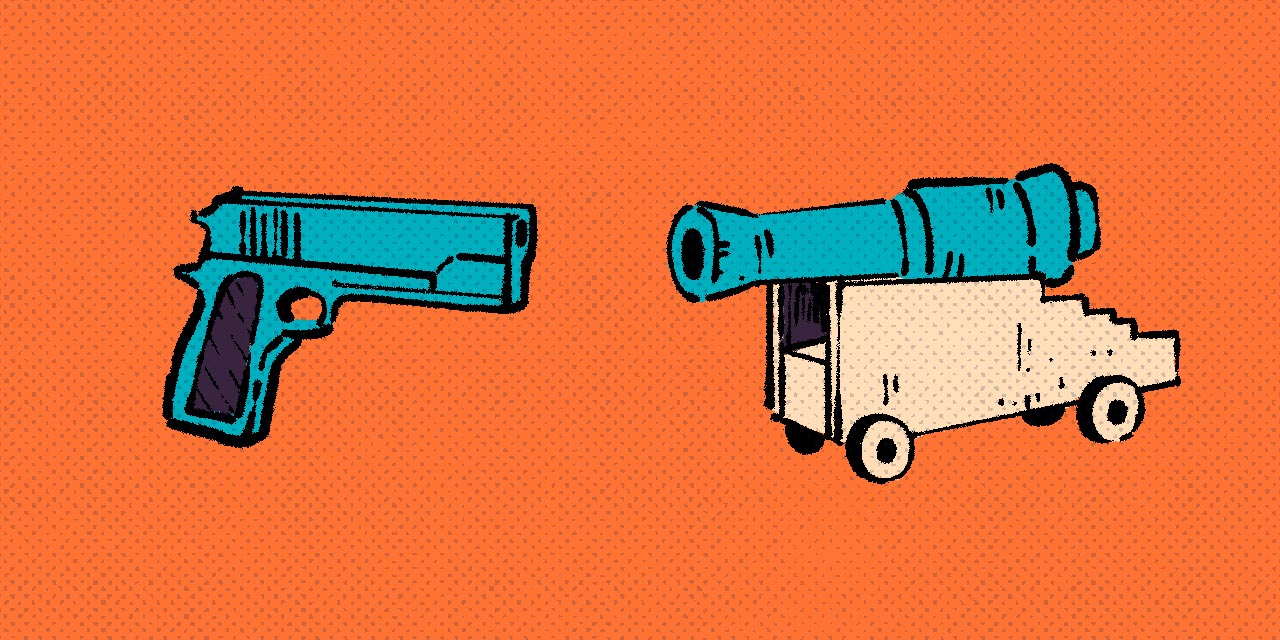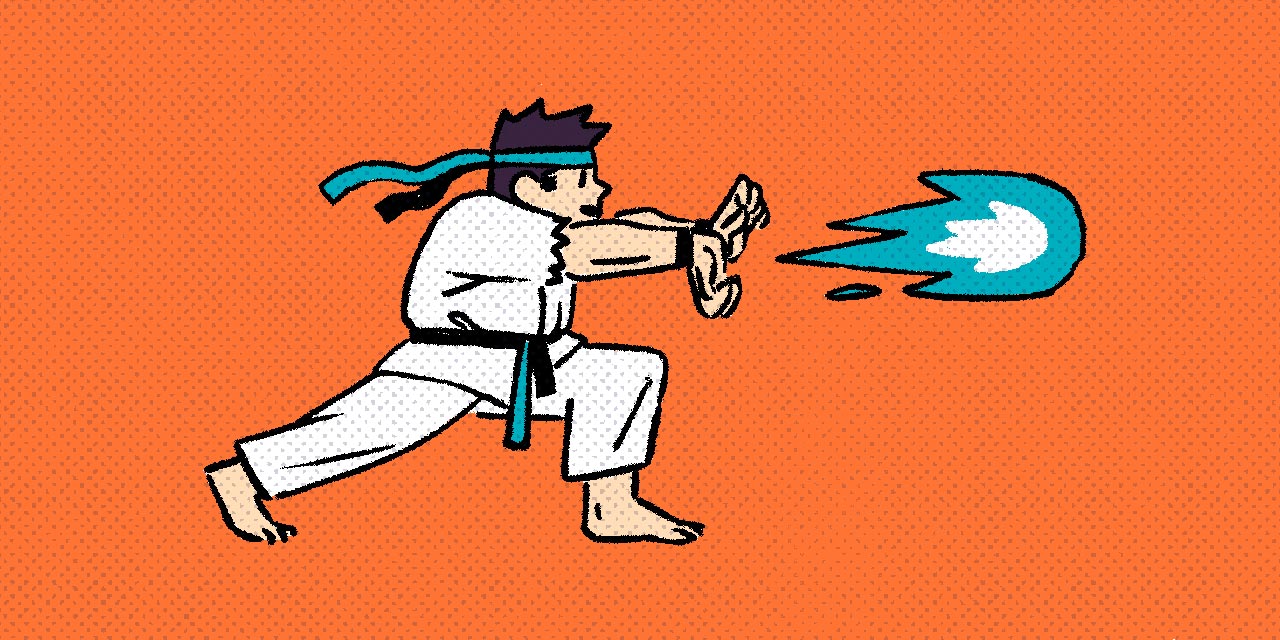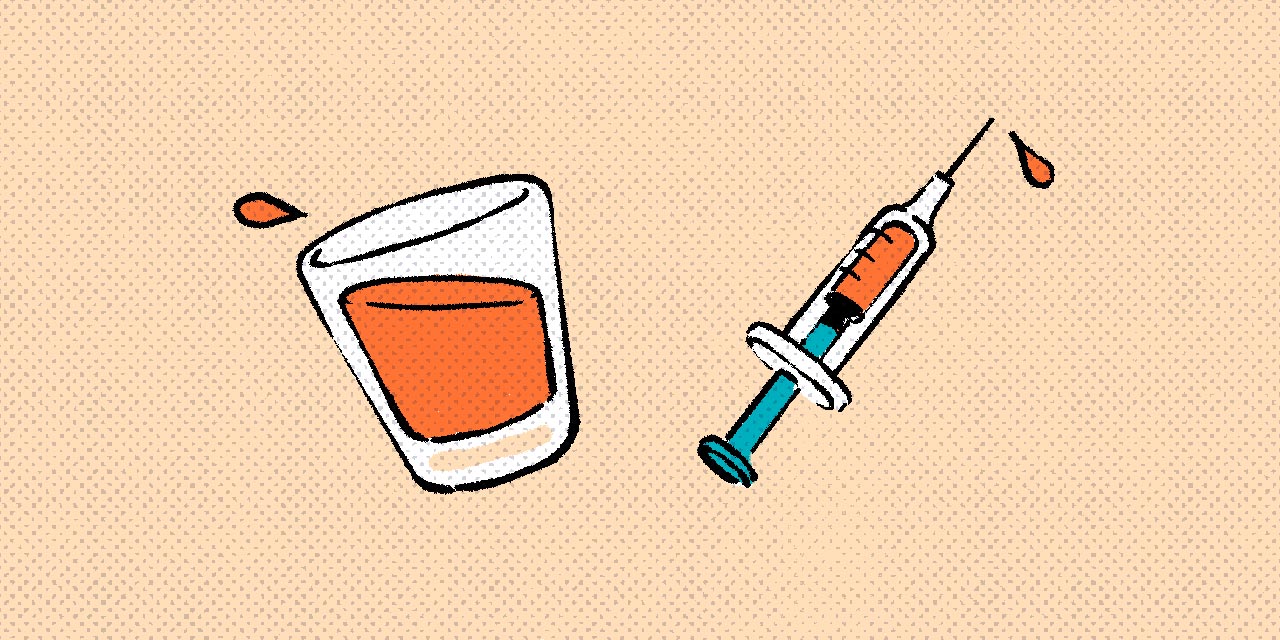The Japanese counter 発 (はつ) is the counter for shots, hits, punches, and many, many more. So many, that we've dedicated most of this article to showing you just how many loud, smacking thwacks 発 can be.
Before we get into usage, take a look at the table below to learn how to pronounce numbers + 発. (And if this is your first time learning about counters, check out our beginner's guide.)
Pronunciation of the Japanese Counter 発
| Numeral | Japanese | Reading 1 | |
|---|---|---|---|
| 1 | 一発 | いっぱつ | |
| 2 | 二発 | にはつ | |
| 3 | 三発 | さんぱつ/さんはつ | |
| 4 | 四発 | よんぱつ/よんはつ | |
| 5 | 五発 | ごはつ | |
| 6 | 六発 | ろっぱつ/ろくはつ | |
| 7 | 七発 | ななはつ (しちはつ) | |
| 8 | 八発 | はっぱつ/はちはつ | |
| 9 | 九発 | きゅうはつ | |
| 10 | 十発 | じゅっぱつ (じっぱつ) | |
| 11 | 十一発 | じゅういっぱつ | |
| 12 | 十二発 | じゅうにはつ | |
| 100 | 百発 | ひゃっぱつ/ひゃくはつ | |
| 1,000 | 千発 | せんぱつ/せんはつ | |
| 10,000 | 一万発 | いちまんぱつ/いちまんはつ | |
| How many | 何発 | なんぱつ/なんはつ |
This one is tricky, but the more you use it, the easier it will be to remember いっぱつ (1発), じゅっぱつ (10発), and ひゃっぱつ (100発).
Alert! This is an irregular counter.
発 (はつ) starts with an h- sound, so based on our normal rules of pronunciation changes, it should become a b- sound. But it doesn't!
The h- sound in はつ either stays as h- or becomes a p- sound instead. If you've read our guide on rendaku, you'll see this pattern is similar to the B or P rule there.
Either way, this one is tricky, but the more you use it, the easier it will be to remember いっぱつ (1発), じゅっぱつ (10発), and ひゃっぱつ (100発).
How to Use the Counter 発
発 is used to count a wide range of things, from gunshots to baseball hits to soccer shots to boxing punches to sneezes to farts to lovemaking. Phew. And it's time to start learning each of them. Bang bang!
Gun and Cannon Shots

Shots fired from a gun or a cannon are counted with 発, regardless of whether they hit their target.
- 銃を三発撃った。
- I shot the gun three times.
- 大砲は、三発中一発だけ命中した。
- Only one of the three cannon shots hit the target.
You can count the sound of gun and cannon shots with 発 too. And when the sound comes from a blank cartridge (no bullet, just sound and light), you can use the Japanese counter 回 as well.
- 突然、二発の銃声が響いた。
- Suddenly, we heard two gunshots.
- 大きな砲声が一発、あたりに轟いた。
- A loud cannon shot reverberated around there.
- 誰かがフライングをした時は、ピストルが二回鳴ります。
- If somebody went before the starter's gun, you'd hear two shots.
Physical bullets and the marks and holes made by bullets are counted with 発 as well.
- あと一発しか残ってないよ。
- I've only got one bullet left.
- ビエトのデスクには、四発の弾痕がある。
- There are four bullet holes on Viet's desk.
Additionally, shots in succession are called 連発 (れんぱつ). So if it's three shots in succession, then it's counted as 三連発 (さんれんぱつ). Because of that, a repeater (repeating rifle) is called 連発銃 (れんぱつじゅう), and a six-shooter (revolver) is called 六連発銃 (ろくれんぱつじゅう).
Missiles and Bombs
We did guns and cannons, but what about missiles and bombs? Just like before, the physical (not-yet-fired) missiles and bombs can be counted with 発, but they can also be counted with the general counter 個 (こ), or 本 (ほん) if they're long and cylinder-shaped, like sticks of dynamite.
- このビルには、時限爆弾が五発仕掛けられている。
- Five time bombs have been planted in this building.
- ミサイルが四発発射された。
- Four missiles have been fired.
- その町には、二発の核爆弾が落とされた。
- Two nuclear bombs were dropped in that town.
- あの国は、最低でも50発の核兵器を保有している。
- That country owns at least fifty nuclear weapons.
- ここに地雷を百個埋めました。
- We laid a hundred landmines here.
- 五本のダイナマイトのうち、一本は不発に終わった。
- One of the five sticks of dynamite misfired.
Fireworks—not small sparklers, but the big ones you shoot into the sky—are a sort of bomb, right? At the very least they explode like them. Either way, they are definitely considered a type of explosion that can be counted with 発.
- そのお祭りでは、毎年一万発の花火が打ち上げられる。
- At the festival, ten thousand fireworks are set off every year.
- 十連発ロケット花火を三十本買ってきたよ。
- We bought thirty ten-shot-rocket fireworks.
Motors and Engines

Motors and engines can be counted with 発 as well, especially the ones used for planes. What's interesting here is that instead of using the numerals one and two, here we use the kanji 単 (たん) and 双 (そう), respectively. For three and up, we use numerals with their kango readings, like you'd expect.
- これは単発の小型機で、あれは双発の中型機、あそこにあるのは、三発の大型機です。
- This is a single-engine light plane, that is a double-engine midsize plane, and that one over there is a triple-engine large plane.
Although this usage isn't very common, the term 単発 (たんぱつ) is. It's used in sports or during games in which there is a single hit, or for one-time jobs or individual tasks, and other things of that nature.
- 単発の小さなヒットの積み重ねが、後の大ヒットに繋がった。
- The accumulation of small, single hits led to a big hit.
- 単発の仕事になるんですが、興味ありませんか?
- This will just be a one-time job—are you interested?
Arrows and Darts
Arrows fired from bows and darts thrown by hand or shot out of a gun are counted with 発.
- 矢を十二発放った。
- I shot twelve arrows.
- 二発目が的に当たった。
- The second shot hit the target.
- 100発投げて、1発しかダーツボードに届かなかった。
- I threw a hundred darts but only one of them reached the dartboard.
What about slingshots? They are also counted with 発!
- 後ろから、パチンコを一発お見舞いした。
- I shot a slingshot from behind.
Superpowers

If you have supernatural powers, say the ability to shoot laser beams from your eyes, or you have a special laser gun from the future—maybe a beam sword where your right arm should be—those are all counted with 発.
- 俺のレーザービームは一時間に十発が限界なんだ。
- My laser beams are limited to ten shots per hour.
- 今日はカメハメ波を九発連続で打ったから、疲れたよ。
- I shot nine kamehameha in a row today, so I'm tired.
Direct Attacks
"Shots" don't always have to mean the kind that are fired out of something or thrown. Sword strokes, tackles, fist punches, elbows, knees, kicks, headbutts, karate chops, and any other physical direct attack can be counted with 発.
- 剣道の試合で、強烈なのを一発頭に食らったんだよ。
- I ate one very heavy shot to the head during my kendo match.
- タックルを三発食らわされた。
- I got hit with three tackles.
- 父さんに朝からゲンコツを二発もお見舞いされたよ。
- I got two fist punches from my dad this morning.
- 肘鉄一発、膝蹴り二発が当たった。
- One elbow and two knees hit him.
- 大声で喚きながら、コウイチは壁に三十三発頭突きをした。
- As he ranted, Koichi banged his head against the wall thirty-three times.
- ビエトは一発の空手チョップで瓦を十枚割った。
- Viet broke ten tiles at once with one karate chop.
- チャンピオンのあの左フック三発が勝負を決めたね。
- The champion's three left hooks got him the win.
Sports Shots

Shots, hits, strokes, or kicks of balls in sports like basketball, tennis, golf or billiards are counted with 発. That said, this counter is not used for players' cumulative records.
- あの代打の一発のおかげで、チーム逆転した。
- Thanks to that pinch hitter's hit, the team won a come-from-behind victory.
- コウイチ選手、今期三本目のホームランです。
- That was the third home run from Koichi this season.
- 一発でグリーンに載せてきましたね。
- He put the ball on the green in one shot, huh?
- シュートを三発打ったが、一発も入らなかった。
- I made three shots, but all of them missed the goal.
- 見事な一発で、エイトボールを落とした。
- He sank the eight ball with a brilliant shot.
Bodily and Other Emissions
Normally, you use the counter 回 (かい) for these, but emissions such as sneezes, burps, or farts can be counted with 発 too, especially when you want to emphasize their force and/or momentum. If you think your yawns are really good, big ones, for example, you could use 発 for them.
- コウイチのあくび三連発の動画がYoutubeにアップされた。
- The video of Koichi yawning three times in a row got uploaded to YouTube.
- クシャミが五発連続で出た。
- I sneezed five times in a row.
- スカンクに、臭いオナラを一発かまされた。
- A skunk shot a stinky fart at me.
Along with expelling air from your body, ejaculations were counted with 発 too. This usage has slowly expanded, and now 発 can be used for counting the number of times someone's had sex. This use case is pretty vulgar, though, so if you'd rather go neutral with it, use 回 instead.
- 彼女と一発やりてぇな。
- I'd like to sleep with her.
- 嫁と久々に三発もしたぜ。
- I had sex with my wife three times, for the first time in a while.
Jokes and puns (that shoot out of your mouth) can count as 発 too. Especially if you think they're really good.
- コウイチは今、「親父ギャグ百連発」という記事を書いています。
- Koichi is currently working on an article called, "An Old Man's 100 Puns."
- そのコメディアンは、鋭いボケを三発かました。
- That comedian made three pointed jokes.
What about ideas, thoughts, or guesses? They're shooting out of your brain, in a sense, so they can be counted with 発. It's really common to use it when counting guesses in gambling, but for the most part, the general Japanese counters つ or 個 (こ) are used more often.
- 今日の俺の競馬の予想、三発中二発的中だったぜ。
- I got two of my three horse-race guesses correct today.
- すんげーアイディアを一発思いついたぜ。
- I've got one big idea!
Other Types of "Shots"

In English, what else do you use "shot" for? Photographs are counted with 枚 (まい), and small alcoholic drinks or single servings of espresso are counted with 杯 (はい). They are not counted with 発.
- ビエトは、私がカリカリベーコンを一枚持っている写真を一枚撮ってくれた。
- Viet took a shot of me holding a crispy strip of bacon.
- エスプレッソをショットで一杯頼んだ。
- I ordered one shot of espresso.
- バーカウンターには、マルガリータのショットが五杯並べられていた。
- On the bar, there were five margarita shots aligned nicely.
What about the launch of a rocket into space? They could be counted with 発, but if you use 発 for a rocket launch, it kind of sounds like a missile launch instead. Rockets by themselves are usually counted with 機 (き) or 台 (だい), and they are used when one is launched too.
- ロケットを一発月にぶちこんでやろうぜ!
- Let's fire a rocket into the moon!
- ロケットが一台発射された。
- One rocket was launched.
Injections of drugs or vaccines are also called shots, so they could be counted with 発, but it's more common to use 本 (ほん). Using 発 for injections counts as slang, so if you hear it in that context, whatever is in that shot probably isn't prescription.
- 今日は予防接種を三本打ってきました。
- I got three vaccines today.
- それから、みんなでヘロインを一発ずつキメたんだ。
- Alright then, we each get one shot of heroin.
Idioms
There are quite a few common idioms that use 発, so here's a handy list you can use to study them:
百発百中(する)
to hit the mark ten times out of ten
never miss the mark/target
- 彼の予想の的中率は百発百中です。
- His forecasts are always dead on.
一発当てる
to hit the jackpot
to succeed
- あいつ、宝くじで一発当てたんだよ。
- He won big in the lottery.
一発勝負(する)
one shot
make-or-break game
- いい?一発勝負だよ。
- This game is make-or-break, alright?
一発逆転(する)
a dramatic come-from-behind victory
turn things around with one move
hit it big
- ここから一発逆転するのは難しいだろう。
- It'd be difficult to turn things around in one go at this point.
一発屋
one-hit wonder (in Japan, this is often used for comedians)
- あの芸人はやっぱり一発屋だったね。
- That comedian was a one-hit wonder, just like we thought, huh?
一発必中
to hit the target with one's first shot
一発必勝/一発大必勝
to pass an exam in one shot
(The two phrases above are usually used as a motto or prayer by themselves.)
一発で〜する
to do 〜 with one shot
EX: 一発で合格する、一発で決める、一発で当てる
- コウイチは一発で東大に合格した。
- Koichi passed the exam for Tokyo University in one try.
- マイケルは一発でシュートを決めた。
- Michael slammed the ball into the goal with one shot.
- マミは本物のベーコンがどれか、一発で当てた。
- Mami figured out which piece of bacon was real with one guess.
Blam! That's All, Folks
You did it! You've completed another counters in our big counter series! We should shoot ten thousand 発 of fireworks to celebrate this moment. Wooosh!!! Bang!!! Hiss!!! Whistle!!! Swirl!!! Flash!!! Burst!!! Sputter!!! Hiss!!! Fizz!!! Whizz!!!
If you're still hungry for more, check out our other counters articles, like 匹, 人, and 羽. And you can learn the basics of Japanese counters too. POW!
-
Cells with multiple entries divided by a
/indicate multiple pronunciations that are equally common. Cells with entries in parentheses indicate that the parenthesized word is an uncommon or archaic pronunciation. ↩
